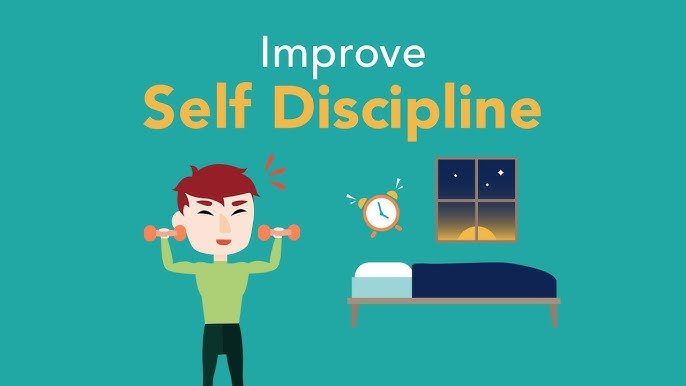Self-Discipline & Willpower

Introduction
Self-discipline and willpower are two fundamental traits that define personal success and self-improvement. These qualities help individuals stay focused on their goals, resist temptations, and persist through challenges. While self-discipline is the ability to regulate behavior over time, willpower is the inner strength to make choices that align with long-term objectives rather than short-term gratification.
What is Self-Discipline?
Self-discipline is the ability to control impulses, emotions, desires, and behavior in order to achieve a higher goal. It involves consistency, determination, and the commitment to follow through with decisions regardless of external circumstances.
Key Points of Self-Discipline:
-
Consistency - Regular habits and routines build discipline over time.
-
Delayed Gratification - The ability to resist immediate pleasures for long-term rewards.
-
Time Management - Effective planning and prioritization lead to disciplined actions.
-
Resilience - The ability to bounce back from failures and setbacks.
-
Accountability - Taking responsibility for one’s actions and progress.
What is Willpower?
Willpower is the mental strength to make decisions and take action despite temptations, distractions, or difficulties. It acts as a muscle that can be strengthened with practice and effort.
Key Points of Willpower:
-
Decision Making - Strengthens the ability to make conscious and beneficial choices.
-
Impulse Control - Helps resist temptations and distractions.
-
Emotional Regulation - Maintains stability in stressful situations.
-
Focus and Concentration - Enhances productivity by eliminating unnecessary distractions.
-
Self-Motivation - Encourages persistence even in challenging circumstances.
The Relationship Between Self-Discipline & Willpower
While self-discipline and willpower are closely related, they serve different functions. Willpower provides the initial drive to start something, whereas self-discipline sustains the effort over time. Willpower is like a battery that depletes with use, while self-discipline is a habit that strengthens over time.
Example:
-
Willpower: Choosing to wake up early to exercise.
-
Self-Discipline: Making it a daily habit to exercise without needing constant motivation.
How to Strengthen Self-Discipline & Willpower
1. Set Clear Goals
-
Define what you want to achieve.
-
Break goals into small, manageable steps.
2. Develop Healthy Habits
-
Create routines that promote discipline.
-
Avoid distractions and time-wasting activities.
3. Practice Mindfulness
-
Be aware of your impulses and thoughts.
-
Train your mind to focus on long-term rewards.
4. Build a Support System
-
Surround yourself with like-minded individuals.
-
Seek encouragement and accountability from peers.
5. Manage Stress and Fatigue
-
Take breaks when needed to avoid burnout.
-
Ensure adequate sleep, nutrition, and exercise.
6. Use the 5-Second Rule
-
Count down from five and take action immediately.
-
This prevents overthinking and hesitation.
7. Reward Yourself
-
Celebrate small achievements.
-
Positive reinforcement strengthens self-discipline.
Here Are The Key Point
a. How to Build Unbreakable Self-Discipline in 30 Days
Building unbreakable self-discipline requires a structured and intentional approach. The following steps provide a comprehensive guide to developing strong self-discipline within 30 days:
-
Set Clear Goals: Define specific, measurable, and realistic goals that will help maintain motivation and direction.
-
Start Small: Focus on making small changes daily instead of overwhelming yourself with drastic transformations.
-
Create a Routine: Establish a daily routine that aligns with your goals and eliminates distractions.
-
Eliminate Temptations: Remove distractions and temptations from your environment to minimize the risk of straying off course.
-
Hold Yourself Accountable: Track your progress using journals, apps, or accountability partners.
-
Practice Delayed Gratification: Train yourself to resist short-term temptations for long-term rewards.
-
Stay Consistent: Discipline is built through repetition, so commit to your daily habits even on challenging days.
-
Review and Adjust: Reflect on your progress weekly and adjust your approach as needed.
By consistently applying these principles, self-discipline becomes a natural part of your lifestyle within a month.
b. Morning Routines of Highly Successful People
Successful individuals often have structured morning routines that set the tone for a productive day. Common practices include:
-
Waking Up Early: Rising early allows time for reflection, planning, and personal development.
-
Exercise: Physical activity boosts energy levels, improves focus, and enhances mood.
-
Meditation & Mindfulness: Practices like meditation help in reducing stress and increasing mental clarity.
-
Journaling & Gratitude Practice: Writing down thoughts and expressing gratitude cultivates a positive mindset.
-
Reading & Learning: Engaging with books or news articles keeps the mind sharp and promotes continuous learning.
-
Healthy Breakfast: Eating a nutritious meal fuels the body and brain for optimal performance.
-
Planning the Day: Reviewing goals and prioritizing tasks ensures a productive and efficient day.
Implementing a structured morning routine helps instill discipline and sets the foundation for success.
c. The Secret to Developing Mental Toughness
Mental toughness is the ability to stay strong in the face of adversity. It is a crucial trait for success and can be developed through:
-
Embracing Discomfort: Stepping out of the comfort zone fosters resilience and growth.
-
Developing a Strong Mindset: Practicing positive self-talk and affirmations helps build inner strength.
-
Managing Stress Effectively: Utilizing techniques like deep breathing, meditation, and physical activity keeps stress under control.
-
Facing Fears Head-On: Confronting challenges directly builds confidence and fortitude.
-
Focusing on Long-Term Goals: Keeping the bigger picture in mind prevents discouragement from short-term failures.
-
Practicing Self-Discipline Daily: Repeating disciplined behaviors strengthens mental endurance over time.
Developing mental toughness requires consistency, but it ultimately leads to resilience and unwavering determination.
d. Why Self-Control is the Key to Success (and How to Master It)
Self-control plays a critical role in achieving long-term success by helping individuals resist impulses and stay focused on their goals. Ways to master self-control include:
-
Understanding Triggers: Identifying what causes impulsive behavior helps in creating strategies to manage them.
-
Practicing Mindfulness: Being aware of thoughts and emotions helps in making better decisions.
-
Setting Boundaries: Learning to say no to distractions and unnecessary commitments is essential.
-
Building Healthy Habits: Replacing negative habits with positive ones enhances discipline and control.
-
Strengthening Willpower: Engaging in activities that require restraint, such as fasting or digital detoxes, builds willpower.
-
Utilizing the Power of Habit: Relying on routines and automatic behaviors reduces the need for constant decision-making.
Mastering self-control results in better decision-making, increased productivity, and sustained success.
e. How to Avoid Burnout While Staying Consistently Disciplined
While discipline is crucial, overworking can lead to burnout. To maintain consistency without exhaustion, consider:
-
Setting Realistic Goals: Avoid overloading yourself with unrealistic expectations.
-
Taking Breaks: Short breaks throughout the day enhance focus and prevent fatigue.
-
Prioritizing Sleep & Rest: Quality sleep is essential for cognitive function and mental clarity.
-
Engaging in Leisure Activities: Hobbies and social interactions rejuvenate the mind.
-
Practicing Self-Care: Physical and mental well-being should be a priority.
-
Learning to Delegate: Sharing responsibilities prevents unnecessary stress and workload.
A balanced approach to discipline ensures sustainable success without compromising health and well-being.
In Conclusion
Self-discipline and willpower are the cornerstones of success. By implementing structured habits, fostering mental toughness, and practicing self-control, individuals can achieve their goals effectively. However, maintaining balance and avoiding burnout is equally important. With consistency and perseverance, anyone can develop the discipline required for long-term success.








